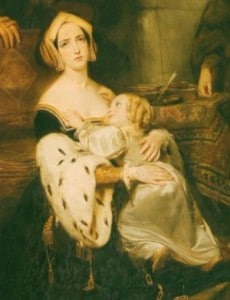
I wanted to share with you snippets I shared last year from my book The Anne Boleyn Collection II regarding what we know about Anne Boleyn and Elizabeth, as mother and daughter. Click here to read that article now.
Sadly, Elizabeth lost her mother in May 1536, but there were a number of women who had an influence on the young Elizabeth and Elizabeth once wrote of her governess Kat Ashley: “We are more bound to them that bringeth us up well, than to our parents, for our parents do that which is natural for them, that is bringeth us into the world, but our bringers up are a cause to make us live well in it.” Other women who influenced Elizabeth include:
- Lady Margaret Bryan, Elizabeth’s governess until 1537.
- Catherine Parr, Henry VIII’s sixth wife.
- Catherine Carey, daughter of Mary Boleyn, and Elizabeth’s cousin and Chief Lady of the Bedchamber.
- Blanche Parry, Elizabeth’s former childhood nurse and Chief Gentlewoman of the Privy Chamber.
- Blanche Herbert, Lady Troy, who is thought to have replaced Lady Bryan in 1537.
You can read more about these people, and other members of the young Elizabeth’s household in my article The Household of Elizabeth Tudor.
On this day in history…
- 1532 – William Warham, Archbishop of Canterbury, criticised Henry VIII in the House of Lords when Parliament was discussing the annulment. The King responded with what historian G. W. Bernard describes as “foul language”.
- 1551 – Lady Mary, sister of Edward VI, and the future Mary I, rode through London causing a stir. It was recorded that Mary and her accompanying gentlemen and ladies were all carrying rosaries “to make an open profession, no doubt, of their devotion for the mass.”
I don’t know what or how much is known about what Elizabeth said about her mother, but I was looking at Lisa Hilton’s Elizabeth: Renaissance Prince the other day and saw this on p 84:
“Venetian ambassador Giovanni Michiel … explains that Elizabeth defended her mother’s marriage, claiming that Anne Boleyn ‘wanted nothing but marriage with the King, with the authority of the Church and its Archbishop. Therefore if she was deceived, she acted in good faith which may not have compromised her marriage or her own (i.e. Elizabeth’s) birth, for she was born in the same faith.'”
Later on the page, Hilton explains:
“Elizabeth apparently did speak of her mother, and stood up for her when challenged. Michiel is not quoting a specific incident or a conversation held directly with Elizabeth; he is citing what he heard about the court.”
Giovanni Michiel’s report is also mentioned in Leanda de Lisle’s book Tudor.
I should add that Giovanni Michiel’s report was in 1557, while Mary was Queen.
Happy Mother Day and Semnel Sunday. Hope all mothers and women have been spoilt today. Also has anyone baked a semnel cake today, as mid Lent is marked by the traditional cake. It is interesting to know that Mothering Sunday is originally dedicated to Mary the Mother of Jesus. The holiday was to honour all women, offered to Mary and men in the community prepared food and gifts for all the women of the villagers, and waited on them. To mark the mid Lent term the rules were relaxed and cakes baked to mark the day. Semnel cakes were not as sweet or as rich as normal cakes, and recipes vary. They are still eaten today.